22 Years After Using Fast ForWord®, Justin Comeaux is a successful software engineer.
Growing up in Ville Platte, Louisiana, in the ‘90s, Justin Comeaux was the friendly kid down the street who loved baseball, music, and his little sister.
But school was hard for him. 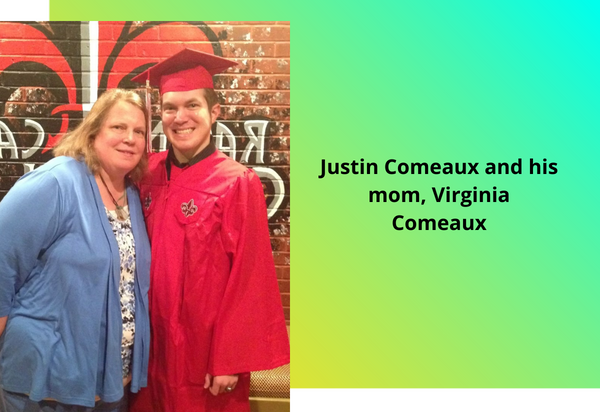
While it would be years before his family learned about his Central Auditory Processing Disorder, it was evident from early on that Justin struggled with basic skills like reading, listening, speaking, retaining information, and even eating. “Since I was a baby, I had challenges with my speech and language development,” Justin shares. “Academically, I was never up to par.”
After years of trying everything from tutors to speech therapy to audiological treatments, Justin was invited to try Fast ForWord, a literacy and language program that was relatively new at the time (2001) and had not yet reached the thousands of students it has helped today.
“At the end of elementary school, I became eligible for this new, innovative program,” Justin explains. “I was told the games would retrain my brain, help me relearn consonant and vowel sounds, and enhance my neural plasticity to improve my processing capabilities. I knew I had nothing to lose, so I went in open-minded and gave it my all.”
As it turns out, Justin’s “all,” coupled with Fast ForWord and his unfailingly supportive family, was enough to turn his life around.
After just eight weeks of using Fast ForWord, Justin began reading and retaining grade-level books for the first time, overcame his stutter, and became a more confident and successful learner.
“You probably can’t even tell that I have a learning disability now,” Justin says. “And that’s because my parents put a lot of love and effort into my upbringing. But it’s also because of Fast ForWord. The program changed my life.”
Here is Justin’s story.
Justin’s Early Childhood Literacy Challenges
Early in Justin’s life, his family noticed that he wasn’t meeting typical infant and toddler developmental milestones.
“I couldn’t talk normally as a child,” Justin states matter-of-factly. “I didn’t say my first sentence until I was four years old. Speech was a problem. So was listening, partially because I couldn’t stand loud noises. Things like fire trucks and ambulances actually physically hurt me.” Luckily for Justin, his parents wasted no time seeking answers and getting help.
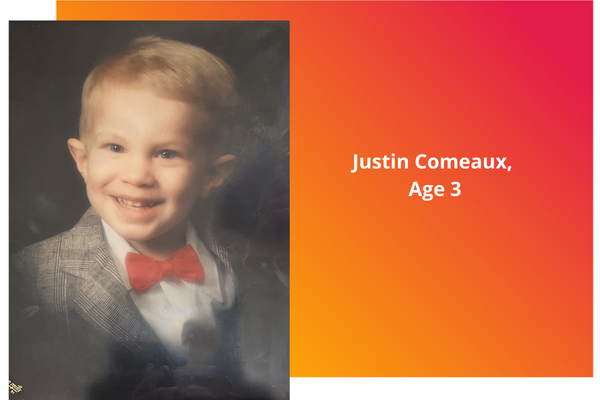 “Because Justin was a late talker,” explains Virginia Comeaux, Justin’s mother, and a registered nurse, “we started with speech therapy when he was two, but no one knew what was wrong with him. When he started school, we were told that he was a friendly, happy child but wasn’t always following directions or staying on task. And on the end-of-year kindergarten tests, he tested below average, but he still went on to 1st grade, where he was evaluated for special education and eventually recommended to repeat the 1st grade. I knew Justin wasn’t lacking knowledge, but he was having trouble expressing himself. And although he did pass 1st grade his first time through, I knew we needed more support.”
“Because Justin was a late talker,” explains Virginia Comeaux, Justin’s mother, and a registered nurse, “we started with speech therapy when he was two, but no one knew what was wrong with him. When he started school, we were told that he was a friendly, happy child but wasn’t always following directions or staying on task. And on the end-of-year kindergarten tests, he tested below average, but he still went on to 1st grade, where he was evaluated for special education and eventually recommended to repeat the 1st grade. I knew Justin wasn’t lacking knowledge, but he was having trouble expressing himself. And although he did pass 1st grade his first time through, I knew we needed more support.”
Justin’s speaking, listening, and reading difficulties were compounded by his issues with food. Although his family and doctors didn’t fully understand why, Justin couldn’t tolerate the foods and drinks that many children his age ate, such as fruit, milk, and hot dogs.
“Lunchtime was hard,” Justin admits. “I would go to the cafeteria, push my plate away, and just cry. Because I wanted to eat, but I had textural problems with certain foods. All the lunch ladies were so kind and tried to cheer me on, but nothing worked. I remember in the 2nd grade when I ate salad for the first time, and the entire cafeteria clapped for me. There were lots of moments like that in my childhood.”
“Justin never complained even though he was a sensitive kid,” Virginia adds. “Even when other kids bullied him for not being able to read well or eat certain foods. I watched how hard it was for him. And I can understand a little of it because I also have a slight speech disorder. I was actually one of the first students in my school’s brand new reading lab when I was in 4th grade. So I had to work hard too, but not as hard as Justin. There were times when I wasn’t sure how we were going to get through it.”
Determined to forge ahead, Virginia and the rest of Justin’s family kept taking Justin to specialists, therapists, and interventionists of every sort. Eventually, they developed a diagnosis that connected Justin’s reading, speaking, listening, eating, and learning challenges.
Justin’s Diagnosis: Central Auditory Processing Disorder
Justin was diagnosed with Central Auditory Processing Disorder (CAPD) right before he began 2nd grade. The American Speech-Language-Hearing Association defines CAPD as “deficits in the neural processing of auditory information.” In simple terms, Justin’s brain could not make sense of the sounds his ears heard.
“This disorder impacted everything,” says Justin. “The way I spoke, the way I listened and learned, even the way I ate. Since I couldn’t understand the information being spoken, I couldn’t retain it. And that affected my learning development for many years.”
While not welcome news, Justin's diagnosis gave him and his family a concrete path of options to try, and, characteristic of Justin’s supporters, they tried just about everything.
“Right after my diagnosis, we started experimental auditory therapies to lower the frequency of my hearing,” says Justin. “It helped a little. I also went through many years of speech therapy. And I had to take so many evaluations. They wanted to put me in special ed because they thought I was autistic. But I wasn’t. I just wasn’t a good communicator or a good learner, which makes sense since I couldn’t process sounds.”
On top of all of Justin’s therapies, his family also employed a constant stream of tutors and put in countless hours working with Justin themselves. “We worked so hard,” Virginia recalls. “As a family. My mother, my father, my brothers and sisters, and my husband. We all worked with him. It was a community effort. And he was worth it.”
Taking a Chance on Something New
While Justin’s literacy skills got a little stronger each school year, both he and his mother knew they hadn’t found the thing he needed to really break through to full proficiency. Or even if that thing existed. But they didn’t give up.
“By 6th grade, he was mostly getting by with Bs and Cs, but he was still struggling with reading,” Virginia explains. “I got a call from the Speech Abilities and Learning Office asking if we would be interested in trying out an experimental program. We said ‘yes.’”
That program was Fast ForWord, an online literacy and language tool that uses neuroscience principles to build reading and cognitive skills.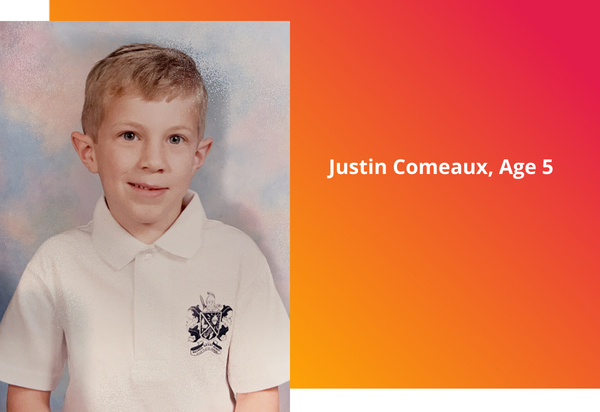
“I did Fast ForWord for eight weeks during the summer of 2001, right before my 7th-grade year,” Justin explains. “From early June to late July, I had to be at the computer four or five mornings a week, and I worked for about three hours a day. It was intense. But, at the same time, comforting. The repetition made my brain happy. It was a natural way for me to learn. I didn’t know it then, but I was retraining myself to process sounds and information, which is exactly what I needed.”
An adaptive and individualized learning software, Fast ForWord introduces learners to a progressive set of literacy skills, such as phonemic awareness, sequencing, and comprehension. The program also builds the underlying cognitive skills of reading with exercises designed to strengthen auditory processing, which was especially crucial to Justin's development. Fast ForWord’s game-based activities are engaging and highly motivating for all students, even those who previously disliked reading.
So, what were the results of Justin’s hard work with Fast ForWord in the summer of 2001? He and his mother say it best.
“I kid you not,” Justin shares, “After those eight weeks, I started speaking better, I started eating properly, I started learning and reading more comprehensively. To this day, it still gives me chills. It was truly life-changing.”
“I saw small changes almost right away,” Virginia adds. “He started asking for food he hadn’t wanted in the past. He started reading by himself. When middle school started, his grades picked up. I didn’t have to help him as much with homework. He really started to thrive, and I cried many tears of joy.”
“It’s truly a miracle that we found Fast ForWord,” Virginia continues. “Especially after we had tried so many other things that didn’t work as well. It took a lot of faith to keep searching. Put Saint Rita in your article somewhere because we prayed to her every day that something like this would come along!”
Academic Success Across the Board
Although it didn’t happen all at once, after his summer with Fast ForWord, Justin started becoming, in his words, “a more independent learner.” By the time he got to high school, he was seeing real academic success, so much so that he was invited to join the National Honor Society and graduated 20th in his class.
Although Justin showed progress in all his classes after using Fast ForWord, the program most notably impacted his reading ability, which, as educators know, is an essential first step of learning across subjects and a general predictor of academic success.
“Before Fast ForWord, I was a really slow reader, and I comprehended almost nothing,” says Justin. “Even though I mostly read comic books and other books with illustrations, the pictures weren’t always enough to help me understand. Now I can read any book I pick up. And, honestly, I’m still a slow reader all these years later, but I grasp information so much better now.”
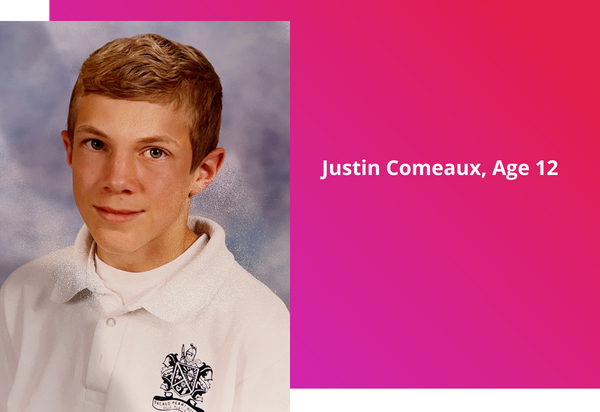 As a child, Justin enjoyed mysteries, particularly R.L. Stein’s Goosebumps series, but before he completed Fast ForWord, his mother had to read them aloud to him because he struggled to read them himself. “After I completed the program, I started to read them to myself,” Justin says proudly. “All of a sudden, I could hear the consonant and vowel sounds and put them together to make words. It was so gratifying.”
As a child, Justin enjoyed mysteries, particularly R.L. Stein’s Goosebumps series, but before he completed Fast ForWord, his mother had to read them aloud to him because he struggled to read them himself. “After I completed the program, I started to read them to myself,” Justin says proudly. “All of a sudden, I could hear the consonant and vowel sounds and put them together to make words. It was so gratifying.”
But Justin didn’t stop there. “I was also able to read the entire Harry Potter series after using Fast ForWord. It was so cool that after this eight-week program, I became interested in reading and could read books that were appropriate for my grade level.”
When asked about his reading habits as an adult, Justin shares that he now “reads a lot of software engineering books for my job. For pleasure, I read autobiographies of musicians I admire, like Dave Grohl from Foo Fighters, and actors like Matthew McConaughey. And daily prayers or anything else inspiring that could help me become a better person.”
When Fast ForWord helped Justin strengthen his phonological awareness, which is a precursor to decoding and blending sounds, his listening and retention skills improved, and so did his speaking.
“Fast ForWord was definitely the fork in the road for my speaking abilities,” Justin shares. “When I started actually hearing sounds, I started stuttering less. One of the reasons behind my stutter was not being able to hear single components of words well enough to put them together. So once I could hear those separate syllables, my stutter got a lot better.”
When Justin could better manage his stutter, he felt more comfortable asking questions in class, joining discussions, and participating in group work, all of which strengthened his learning capabilities. He also began getting more out of his speech therapy sessions, which further improved his communicative skills and his general well-being.
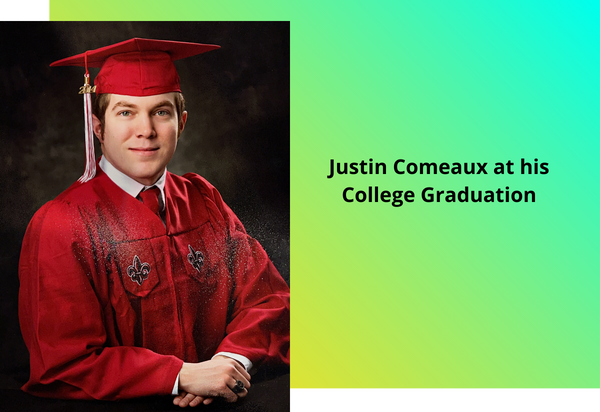
Fast ForWord helped Justin find his footing in the rocky social landscape of middle school, which is a critical time of adolescent emotional and cognitive development.
“I went through Fast ForWord while going through puberty,” Justin points out, “Which is an awkward time for everyone, but all my learning issues made it even harder.”
Going into junior high, he and his mother knew he needed to boost his confidence, and they also knew that the timing was critical.
“There was some bullying in elementary school,” Virginia shares, “but I knew that as kids got older, it could get worse, so Fast ForWord came to us at just the right time.”
Happily, Justin reports that after using Fast ForWord, he had much less social anxiety about the way he talked and presented himself in class, which, in turn, gave him more confidence.
“I know my personality changed for the better after using Fast ForWord,” Justin reports. “Because I was more comfortable in my skin, and I could show up as more of myself. And other kids picked up on that. The program definitely made making friends easier for me.”
Paying It Forward: Justin’s Career as a Software Developer
Justin’s the type of person who, when good things happen to him, he wants to share the joy with as many people as he can. That’s why he attributes his career decision to his time spent working with Fast ForWord.
“After my experience with Fast ForWord, I knew that I wanted to become a software developer because I realized how this field could help people. And I always tell my Fast ForWord story when people ask me why I chose the career I did. I was helped. And now I want to pay it forward.”
“Justin told me, ‘Mama, this software helped me,’” adds Virginia. “‘And now, I want to build software that helps others.’ So that’s the plan we made for Justin’s life after high school.”
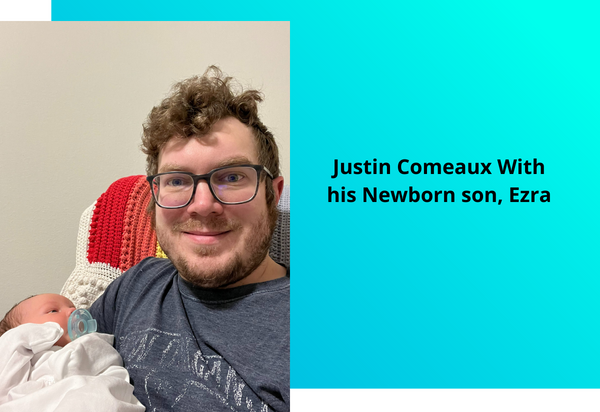 After graduating, Justin studied informational technology systems for two years in junior college, where he graduated with honors and was named Student of the Year twice. “He was friends with everyone at that school,” Virginia shares. “The professors, the janitors, the people who worked at the campus pool where he lifeguarded. When he graduated, he received a standing ovation from all the people whose lives he touched. He’s just the kind of person people want to see succeed.”
After graduating, Justin studied informational technology systems for two years in junior college, where he graduated with honors and was named Student of the Year twice. “He was friends with everyone at that school,” Virginia shares. “The professors, the janitors, the people who worked at the campus pool where he lifeguarded. When he graduated, he received a standing ovation from all the people whose lives he touched. He’s just the kind of person people want to see succeed.”
Justin then went on to study computer science at the University of Louisiana at Lafayette. While there, he wrote a term paper titled "Fast ForWord: Technology’s Gift for Learning Disabled People" for a computer science course. Along with the paper, Justin gave a presentation where he highlighted just how much Fast ForWord had improved his reading, speaking, and processing abilities.
“My professor didn’t tell me this until later,” Justin shares, “but he actually teared up during my presentation. He was so moved to hear about my childhood struggles and the personal impact the program had on me.”
Justin worked hard in college, and even though his CAPD was still part of his journey, he did find success in a field he loved. “I won’t pretend it came easy,” says Virginia of Justin’s college years. “He had to study really hard. He would call me all the time and say, ‘Mama, it’s hard. I don’t know if I can do it.’ And I said, ‘Yes, you can.’ And he did."
Today, Justin, who is happily married to his wife, Caitlin, and a father to his newborn son, Ezra, is a thriving software developer.
A Mother’s Perspective on Fast ForWord
When Virginia reflects on her journey supporting Justin through his years of schooling, she laughs about her daily ritual of calling all of Justin’s teachers and even some of his classmates to get the details on that night’s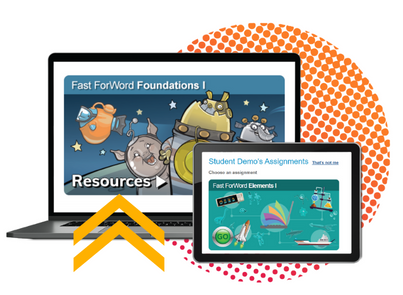 homework so she could help him with it.
homework so she could help him with it.
“I know after a while they were, like, ‘Oh no, here she comes again!’ But the truth is, every parent who has a child with a disability will fight for their child. And if we hadn’t had access to Fast ForWord, I know Justin would have struggled so much more in school. I’ll say it to anyone who will listen. Whoever made this program is helping people.”
To other parents or caregivers whose children are facing some of the same academic challenges Justin went through, Virginia says, “Don’t give up. Because it will get better if they keep working hard, and they will find the career they are best suited for. But also look for resources. I personally think all children should go through Fast ForWord, and it should be in every school. I think it’s a program for everybody.”
Gratitude All Around
It's not every day that the one life-changing summer starts with computer software. To think that eight short weeks could help a preteen blossom into a confident, articulate book lover and software engineer whose CAPD is hardly discernible is something to celebrate. But it doesn't have to be a rare occurrence.
“Everyone has their journey,” says Justin, reflecting on how his story could inspire kids who are currently struggling with reading and learning. “And some journeys are harder than others. But I surrounded myself with good people and tried to find what was unique about me. We didn’t know how the journey was going to end. But then we came across Fast ForWord, which was the right tool at the right time. So never give up on yourself, even if your problems seem unsolvable. Because there is a solution.”

Before joining Carnegie Learning’s marketing team in 2021, Emily Anderson spent 16 years teaching middle school, high school, and college English in classrooms throughout Virginia, Pennsylvania, California, and Minnesota. During these years, Emily developed a passion for designing exciting, relatable curricula and developing transformative teaching strategies. She holds master's degrees in English and Women’s Studies and a doctorate in American literature and lives for those classroom moments when students learn something that will forever change them. She loves helping amazing teachers achieve more of these moments in their classrooms.
Explore more related to this authorAfter those eight weeks [of using Fast ForWord], I started speaking better, I started eating properly, I started learning and reading more comprehensively. To this day, it still gives me chills. It was truly life-changing.
Justin Comeaux, software engineer and former Fast ForWord user

Filed Under
Tags
